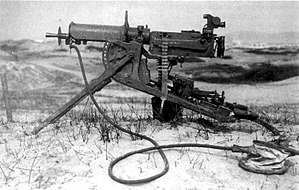| Maschinengewehr 08 | |
|---|---|
 Maschinengewehr 08 deployed in sandy terrain | |
| Type |
|
| Place of origin | German Empire |
| Service history | |
| In service | 1908–1945 (Germany) 1911–1960s (China) |
| Used by | 25+ countries See Users |
| Wars | See Conflicts |
| Production history | |
| Designer | Deutsche Waffen und Munitionsfabriken (DWM) Spandau Arsenal |
| Manufacturer | DWM Spandau and Erfurt arsenals Hanyang Arsenal |
| No. built | 225,000+ 72,000 MG 08[1] 130,000 MG 08/15[1] 23,000 LMG 08/15 |
| Variants | lMG 08 MG 08/15 LMG 08/15 MG 08/18 HMG Type 24 |
| Specifications | |
| Mass | Total 69 kg (152.1 lb) with water, 65 kg (143.3 lb) without water 26.5 kg (58.4 lb) gun body, 4 kg (8.8 lb) of water, 38.5 kg (84.9 lb) tripod |
| Length | 1,175 mm (46.3 in) |
| Barrel length | 721 mm (28.4 in) |
| Crew | 4 |
| Cartridge | 7.92×57mm Mauser 7.65×53mm Mauser 7x57mm Mauser 13×92mm TuF (TuF variant) |
| Action | Short recoil, toggle locked |
| Rate of fire | 450-500 rounds/min |
| Muzzle velocity | 878 m/s (2,881 ft/s) with (S Patrone) 765 m/s (2,510 ft/s) (s.S. Patrone) |
| Effective firing range | 2,000 m (2,187 yd) |
| Maximum firing range | 3,700 m (4,046 yd) (S Patrone) 4,700 m (5,140 yd) (s.S. Patrone) |
| Feed system | 250-round fabric belt 500-round fabric belt (aircraft) |
The MG 08 (Maschinengewehr 08) is a heavy machine gun (HMG) which served as the standard HMG of the Imperial German Army during World War I. It was an adaptation of Hiram Maxim's 1884 Maxim gun design, and was produced in a number of variants during the war. The MG 08 also saw service during World War II in the infantry divisions of the German Army, although by the end of the war it had mostly been relegated to second-rate "fortress" units.
Named after 1908, the year it was adopted by the Imperial German Army, the MG 08 was a development of the license-made Maschinengewehr 01. The MG 08's rate of fire depends on the lock assembly used and averages 500 rounds per minute for the Schloss 08 and 600 rounds per minute for the Schloss 16. Additional telescopic sights were also developed and used in large quantities during World War I to enable the MG 08 to be used in long-range direct fire and indirect fire support roles.